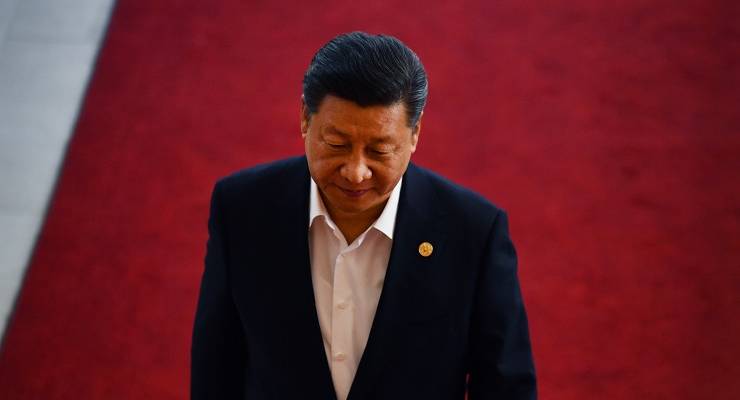
Recent events have shown just how economically dependent Australia is on China.
The proximate cause — Australia’s call for an independent inquiry into the origins of COVID-19 — will fade.
China was sensitive about it as much due to context as content. US President Donald Trump’s campaign ads are now blaming China for the virus, and pushing the idea that Democratic rival Joe Biden is too close to China. With names flying about, China is concerned about other countries taking sides.
For Australia, China’s sensitivity involved initially broad but undefined threats to trade, and then bit with health bans on meat exporters and, just today, an 80% tariff on Australian barley.
Some commentators have called the proposal for an independent COVID-19 inquiry a question of values and national sovereignty.
There are, of course, values worth sticking up to China for: human rights, press freedom, fair treatment for Australians living in China to name a few.
But the call for an inquiry was not a value. It will help other countries as much as, and probably more than, Australia. Experts think it was going to happen anyway. The Lowy Institute makes a compelling case that national sovereignty is a misleading way to view the question.
The way this relatively minor issue was escalated does show how some among the commentariat — and our national security establishment — are itching for confrontation with China, regardless of economic cost.
Australia has a longstanding policy of not taking sides between China and the USA.
A minority strand of thought, however, is that China poses a threat and that our national interest is best served by confrontation. That strand has reemerged.
As China under President Xi Jinping becomes more hardline and authoritarian, the case for being wary has strengthened. But there is a big difference between sensible caution and needless provocation.
Right now we need China more than it needs us. It is our major trading partner by a long way. Its economy is ten times the size of ours — twenty times if measured in terms of purchasing power parity (GDP adjusted by how things cost inside a country) by which measure China has the world’s largest economy.
China has strengthened its supply chains through the Belt and Road initiative since 2013. While Belt and Road infrastructure in some countries may not survive the economic stresses of COVID-19, much will remain.
In the same period Australia has become more, not less, dependent on foreign infrastructure for exports.
It is clearly desirable to spread our risks, not put all the export eggs into one basket. However, reducing reliance on China won’t be easy.
Businesses that have spent decades building up the relationships required for trading in China won’t want to give them up. Trade with China requires personal contacts based on genuine understanding. Legal formalities are secondary. Not all connections are mercenary — many businesses that export to China have made friends there.
A myriad of Australian sole traders have turned the purchase and shipping of consumer goods to China (daigou) into a billion dollar export industry. They have no other options.
Even for businesses that want to, finding alternative overseas markets is hard.
As economist Stephen Koukoulas has pointed out, if other countries don’t want our stuff we can’t make them buy it.
Leaving diversification to the market is a good idea in theory but won’t work quickly and may not work at all.
Some prospective markets in Africa and South-East Asia expect the Australian government to support exporters — either explicitly through arranging contracts or implicitly through making contacts.
India, frequently touted as an alternative to China because it too has a huge population, is nowhere near as attractive. It is poorer, has huge disparities of wealth and a rigid bureaucracy which is hard to navigate.
The best alternative country with which Australia should forge stronger links is Indonesia — close, democratic, big (a population of 270 million) and growing strongly.
But it is suffering badly from COVID-19, relationships will take time to build, and Australian businesses and universities to date have been inexplicably blind to Indonesia’s attractiveness as a trading partner.
Small and geographically spread countries in the south pacific are worth considering as potential trade partners for services and consumer goods but too small to be a replacement market for bulk exports of mining or agricultural commodities.
Diversification to different countries is thus complex and time consuming.
Trade Minister Simon Birmingham correctly expects business will, of their own accord, want to spread their risks across numerous markets. But business cannot do everything.
Australian schools and universities have reduced their teaching of foreign languages, especially Asian languages. The government’s social, education, defence and cultural ties with key partners such as Indonesia are weaker than they would be if they were a serious trading alternative.
Politicians are prone to creating problems, generally inadvertently, with neighbouring countries. These are all barriers.
Diversification is easy to say, hard to do. It will need support for the long haul.








So the ‘megaphone’ diplomacy as practiced by our new Ministers for Foreign Affairs and for Trade Messrs’ Dutton and Hastie (ably advised by the ASPI and the IPA and certain Australian Journalists and the Donald Trump and the US Ambassador) have not only failed to obtain the sort of Inquiry that they wanted but have endangered our trading relationship at the time of an economic and health crisis. Well done chaps – and you too Morrison and Payne and Birmingham for not having the spine to stand up to Dutton and Hastie and Trump
What I find interesting is that Dutton keeps piping up all the time, with mostly ill informed commentary about all sorts of issues, that have nothing to do with Home Affairs.
You would think he would just focus on all the problems in his own portfolio; there are so many. Indeed Home Affairs reportedly has the worst morale in the entire Public Service, which is probably a reflection of the poor leadership of Dutton and Pezzullo.
So why does Dutton waste so much time commenting about so many other issues? Why does he feel the need to be always in front of the media?
Does he think he’s the Prime Minister? Or is another challenge for the leadership on the cards?
All of the above, MickeyD. Turnbull said in his recent book that he was amazed when he realized that Dutton actually believed he could be Prime Minister. He really seems to believe he and his Santamaria (or is it Bannon) clone Pezzullo could drag us back 70 years to the 1950s. A classic example of the Dunning-Kruger effect. It would be farcical except there seems to be a degree of support for this imbecile in the LNP.
The foghorn diplomacy of Morrison showing how he had spoken to his mentor Trump and how he would demand action and send ‘weapons inspectors into China to sort out the source of the corona virus was absurd. It shows his utter ignorance of the real situation. The blame for the barley fiasco lies solely at his feet.
Agree, Richard…and the ‘investigation’ now proposed says nothing about China specifically. So Sooty from marketing has failed on all fronts! Idiot!!
Reasonable article, except for describing Indonesia as democratic. Indonesia democratic?? WTF
There are many definitions and levels of democracy buy one fundamental one is free, regular and fair elections which can result in a change of government. Indonesia meets this basic criterion, unlike its closest neighbor, Singapore. Its democracy may be fragile, but it is still a democracy.
Hi Oldie. Your bar for what constitutes democracy is set far too low. Words have to mean something, and to describe Indonesia’s violent and corrupt electoral process as free and fair is distorting the truth. Add on-going state supported political violence and the repression of unions and call it for what it is: an ugly and authoritarian state
Having said that, I acknowledge that it does not really matter for the purpose of your article whether Indonesia is a democracy or a crypto-dictatorship, as it was not the point of your article.
I suspect that Australia is collateral damage for the FTAs between China and USA, as apparently China is not importing enough stuff from USA and this redirecting of the supply of barley from Australia to USA will help solve that problem. Morrison piping up like he did with his megaphone was the catalyst for China to act and fix the problem.
I think that a lot of Australians would accept a drop in exports if it curtailed the overweening arrogance of the tax avoiding resource moguls currently exploiting the nation.